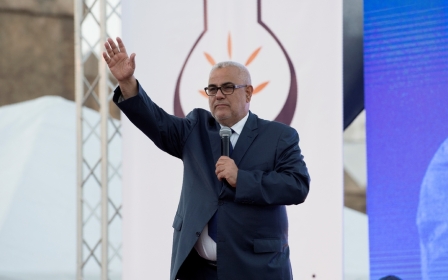Morocco king appoints Islamist Benkirane as PM following elections

Morocco's King Mohammed VI on Monday tasked Abdelilah Benkirane to keep his post as prime minister and form a new government, after his Islamist party won last week's parliamentary elections, the royal court said.
Benkirane's Islamist Justice and Development Party (PJD) took 125 seats out of 395 in Friday's polls, beating its main rival, the Authenticity and Modernity Party (PAM), which had campaigned against the "Islamisation" of Moroccan society.
"His Majesty King Mohammed VI has appointed Mr Benkirane prime minister and tasked him with forming a new government," the royal court said in a statement.
The appointment comes in line with the constitution, which grants the monarch the authority to choose the prime minister from the biggest party in parliament.
Although it clinched the most seats in Friday's vote, the PJD did not secure absolute majority - 198 seats - and therefore must forge a coalition with other parties.
It needs to make an alliance with 73 parliamentarians.
Benkirane confirmed his nomination and told reporters he hoped to carry out his duties well.
"I will hold consultations with the political parties very soon in order to form the government and I hope that we will all be successful," he said.
The PJD came to power in 2011, months after massive street protests prompted concessions from the monarchy.
A new constitution transferred some of the king's powers to parliament, at a time when autocratic regimes were falling in Tunisia, Egypt and Libya.
Although the King remains decision-maker on strategic issues, the new constitution strengthened the position of the prime minister, giving the premier the power to dismiss parliament, which until then had been the privilege of the king.
During Benkirane's first five-year term as prime minister, the PJD passed a controversial reform of the retirement system that raised the age of retirement to 63 from 60 by 2020 and increased workers’ contributions to the programme. The PJD followed a relatively liberal economic policy.
Its task was complicated by the unstable world economy and a drought this year that hit Morocco's vital agricultural sector and sent growth plummeting.
The party was also weakened by rising unemployment and what critics say is a failure to make good on promises in 2011 to tackle corruption.
And it faced a string of scandals within its ranks including a drugs bust, a land-grab deal and the suspension of two vice presidents found in a "sexual position" on a beach.
The opposition PAM, formed in 2008 by a close adviser to the king, poured enormous resources into a campaign criticising the government's economic record as "catastrophic" and pledging to roll back the "Islamisation" of society. The party took 102 seats.
Before the elections, the PJD and the PAM ruled out joining forces in a coalition.
Stay informed with MEE's newsletters
Sign up to get the latest alerts, insights and analysis, starting with Turkey Unpacked
Middle East Eye delivers independent and unrivalled coverage and analysis of the Middle East, North Africa and beyond. To learn more about republishing this content and the associated fees, please fill out this form. More about MEE can be found here.





